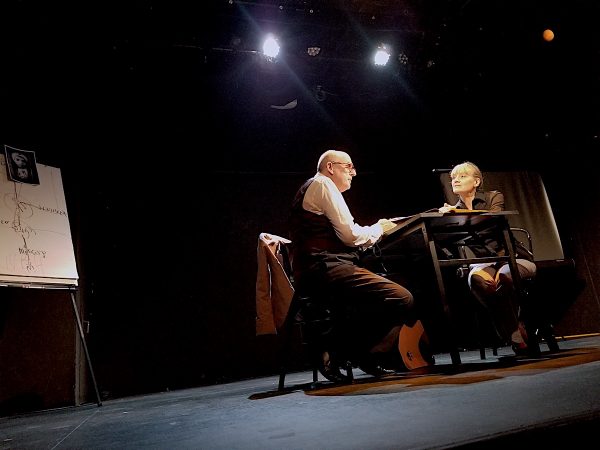“We see which way the stream of time doth run.”
– Henry IV, Part II
In July the cobbled streets of Avignon fill with theatre-makers and theatre-lovers. It is time once again for the Avignon Festival, and its parallel fringe, Avignon OFF. There are well more than one thousand actors, playwrights, directors, and performers of different disciplines, and many thousands of audience members to greet them.
I had not been to Avignon in some years. The first time I went I was part of a delegation from the International Theatre Institute. My memory’s imperfect. I recall being airlifted in after dark, then being shuttled from one performance to another until the sun came. I couldn’t tell you the names of the groups or even what languages they were performing in. There were vast spaces in ancient stone buildings, bleacher seats, the smell of sweat and heat, lithe men and women in blue silk dancing improbably on precipitously angled scenery, ritualized movements, texts that I could not decipher but for which, somehow, deciphering did not matter, because a meaning came through.
At least I got a meaning at the time. What that meaning was, now, is not certain to me, time being what it is, although there is no doubt that my early experiences at Avignon shaped my passions for the shared community of theatre and storytelling.
This year Avignon held special meaning for me again, also related to time. The French premiere of Le Corbeau Blanc by Donald Freed—known to English-language audiences as The White Crow. In 1984, I produced the world premiere of the play at the Los Angeles Actors’ Theatre. The lead roles were created by Salome Jens and Gerald Hiken; Diane White produced it with me; Charles Marowitz directed.
It’s moving to discover your earlier work, the work of your earlier self, standing up to the test of time. Which The White Crow does. Set in an interrogation cell in Jerusalem in 1960, the play imagines a series of confrontations between Adolf Eichmann, recently captured and awaiting trial for his role in the Nazi’s genocide of Jewish populations, and Dr. Baum, detailed by the court to probe his psychology and tasked to extract a confession.
In the Avignon production, Nadège Perrier and Hervé Van der Meulen played Baum and Eichmann, and William Mesguich directed. Running a tight 75 minutes, the production is taught, exceptionally well-acted, and giving of truth and light.

A few decades ago, when I began my extended “vacation” from theatre and turned my career to filmmaking, I had become frustrated with theatre’s ephemera. At the time I felt that plays evaporated after a few week’s run, and that cinema would be more long-lasting.
Instead, it’s just the opposite. Films disappear quickly. We work on them for five-to-ten years, wrestle in production and post for another two years, and then… most of the time, poof, they vanish in a weekend. Theatre, in contrast, because it is remade for each production, has the capacity to divert the stream of time. Or to make the stream renewed.
By the same author: Why Theatre Will Survive; How Theatre Invented Democracy, Part I; Theatre and Democracy, Part II.
